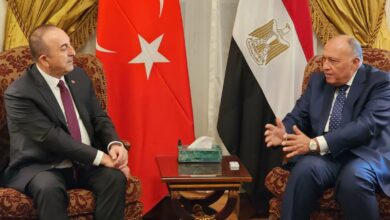The present situation in Libya is quite fluid. Very few Arabs want the regime of Muammar Qadhafi to stay. At the same time, those who support the West's intervention have misgivings about its double standards. The Arab public does not like to hear a NATO general order Qaddafi to leave; his departure must be a response to the unequivocal voice of the Libyan people.
The critical question now is whether or not an international air strike campaign can avoid civilian casualties and not escalate into a foreign military occupation.
Most western powers involved in military action against Libya had close ties with Qadhafi's regime. The scandal-ridden Silvio Berlusconi made Italy a gateway for the Libyan regime to Europe, and the discredited Tony Blair offered training to Libyan special forces. These powers are seen by many Arabs not as liberators of the Libyan people, but as opportunistic interventionists, even if their actions help oust Qadhafi’s regime.
Many Arab commentators and citizens wonder what are these same powers doing about the Yemeni president Ali Saleh whose forces have killed tens of peaceful demonstrators and wounded thousands of others? Why did Western powers not publicly tell former presidents Mubarak of Egypt and Ben Ali of Tunisia to step down, as their people were demanding? And how will Europe and the United States act toward other Arab regimes that still cling to power against the will of their people?
Yes, in the case of Libya there were legitimate fears of large-scale massacres and repression as Qadhafi’s forces were closing in on the rebels. It's also true that Western states obtained necessary approvals from the Arab League and the UN Security Council before acting. But they had lobbied for these green lights. Why didn't they do the same when Israel pummeled Lebanon in 2006 and Gaza less than two years later, with weapons far more lethal and with much greater intensity than that of the Libyan government?
The United States not only encouraged Israel’s aggression, it also blocked action on the Goldstone report that charged the Israeli military with committing war crimes in Gaza. More recently, the United States has vetoed a UN Security Council resolution calling on Israel to halt Jewish settlement building on Palestinian land.
Libya's faces a conundrum today because Muammar Qadhafi refused to heed the lesson of his two immediate neighbors, Egypt and Tunisia. He considered Libya's protesters to be immature youngsters under the influence of hallucinatory drugs. Like many a dictator, Qadhafi has enclosed himself in a bubble where he weaves together fictions about his own ingenuity, his widespread popular support and his indispensability for the stability of his nation. These fictions have become integral to Qadhafi's identity and self-perception and, in the present context, he cannot but deny a reality that looks much different.
Arab countries, and states of the Global South more generally, also deserve blame for their inability (or unwillingness) to take responsibility for their own security. Why can't Turkey, Egypt, South Africa, Brazil, and India enforce a no-fly zone in Libya? These countries are all democracies and have the wherewithal for such a task.
Yes, Egypt is going through a transition, but Libya is its next door neighbor where hundreds of thousands of Egyptians have found employment. These states could have spearheaded the intervention, and asked for logistical help, if they needed it. Hasn't the time come for these countries to shape a new security order (not just an economic order), rather than leaving the task to former colonial powers?
It remains unclear how the opposition in Libya decided on a military confrontation with the regime’s forces, and whether this was the only choice on the table. We've learned from Tunisia, Egypt (and maybe from Yemen) that ousting a regime needs a build-up of mass protests. In Libya, things initially seemed to be going in that direction. The only major population center that was unable to rise up was Tripoli, the capital city.
Qadhafi's response to the protests was merciless, to be sure, but did that require a turn to armed revolt? Will Libya's pro-democracy movement be able to return once more to a popular, mass uprising? Can they steer events without a costly dependence on big powers?
The no-fly zone, air raids and political isolation of the regime should improve the rebels' position considerably. But they need to take the initiative from here on and seek help from Arab governments and organizations that can and are willing to furnish it. A peaceful, popular revolution is the best guarantee against foreign occupation and internal divisions, and for a new representative government.
Sharif S. Elmusa is an associate professor of political science at the American University in Cairo.




